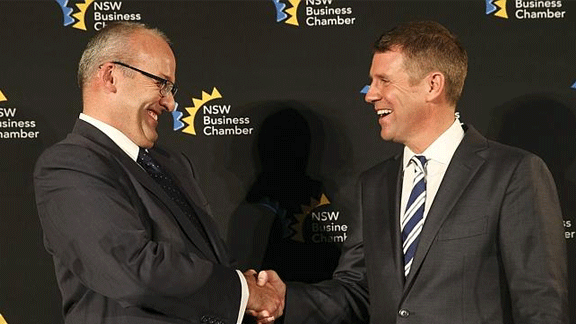Libs to lose ground in NSW

The NSW Liberal government is facing a big negative swing in the upcoming state election.
The central battleground is premier Mike Baird’s promise to partially privatise electricity distribution. As early as last November almost 70 percent of NSW voters opposed this.
Even the government shows some awareness of this – it won’t say the word “privatisation”, preferring to talk about “leasing arrangements”.
Spurred on by the successful Victorian union election campaign, Unions NSW has run a campaign, “NSW Not For Sale”, involving thousands of union volunteers door knocking, leafleting and phoning. It doesn’t explicitly mention the ALP or its new leader, Luke Foley.
Unlike the Victorian and Queensland elections, the Coalition has not spent much time trying to tar the ALP as captives of the unions.
The Daily Telegraph tried to run the “beholden to the unions” line on 12 March, decrying “commitments lobbied for by unions. These include legislating nurse-to-patient ratios in a nod to the NSW Nurses’ Association … a continued fight against the privatisation of the electricity network … [and] extra jobs for nurses, paramedics and teachers.”
Proving he is less of an idiot than the Daily Telegraph journalist, Luke Foley said he made “no apologies” for the promises.
NSW won’t just be a re-run of Victoria and Queensland. Baird is not as unpopular as Queensland’s Campbell Newman was, and the Liberal incumbents have a large majority in the parliament, an advantage they lacked in Victoria.
But the Abbott factor is in play, with the federal government more of a millstone every day. In mid-March, Fairfax/Ipsos polling revealed that close to one in 10 voters who supported the Coalition at the 2011 state election intended to change their vote on 28 March due to the performance of the federal government.
Despite Baird saying he’d be happy to have Abbott help out, he has so far appeared alongside Baird precisely once.
The Greens may be on track to win a second lower house seat, but the widespread opposition to the Baird government's electricity privatisation plans has to some degree marginalised them (the Daily Telegraph colouring Luke Foley’s face green and dubbing him “Luke Foliage” notwithstanding). They have, however, secured a preference deal with Labor in 23 key seats and the upper house.
The agreement is a turnaround from 2011, when the Greens preferenced Labor in only a handful of seats. Greens campaign director Chris Harris has attributed the shift to “opposition to the state government’s privatisation proposals and federal and state government cuts to public and community services”.
Unsurprisingly, given its record in government, the ALP is hardly inspiring the electorate. Other than scrapping Baird’s privatisation plans, Labor offers little. And despite the departure of a record number of Coalition MPs due to corruption charges, the equally-corrupt Labor Party dares not mention ICAC.
But while little popular enthusiasm surrounds the campaign, the bosses and their mouthpieces are actually very interested in this election.
They may have given up on Abbott, but they still want to prosecute the argument that you can’t pay for new infrastructure without privatisation.
It’s a lie – the government could increase taxes, or just borrow the money. Nevertheless, current polling indicates the bosses will get their wish, with the Coalition leading Labor by, at worst, 53 per cent to 47 per cent on a two-party preferred (TPP) basis.
However, like Queensland, NSW has optional preferential voting which means the TPP vote is exaggerated. The government could still be defeated, or reduced to minority status, if the swing is great enough.
But a change of government will not change much.
Unions have responded too weakly and too infrequently to the attacks made on us by both Liberal and Labor administrations. There are, however, examples we can look to.
When O’Farrell announced mass job cuts in 2011, 40,000 workers took the day off for an angry rally. The following year, when he attacked workers’ compensation, the fire brigades union went on strike, blocking Macquarie Street with fire engines that hosed down Parliament House.
FBEU Secretary Jim Casey said of the strike: “That strike was a significant victory for two reasons: firstly, it has meant that literally millions of dollars have since been paid to injured firefighters who otherwise would not have been covered under the O’Farrell/Baird Government’s vicious workers comp ‘reforms’; and secondly, it was the first (and arguably only) time the government has been beaten back by direct industrial action.”
We need more protests and more strikes whoever wins the election.